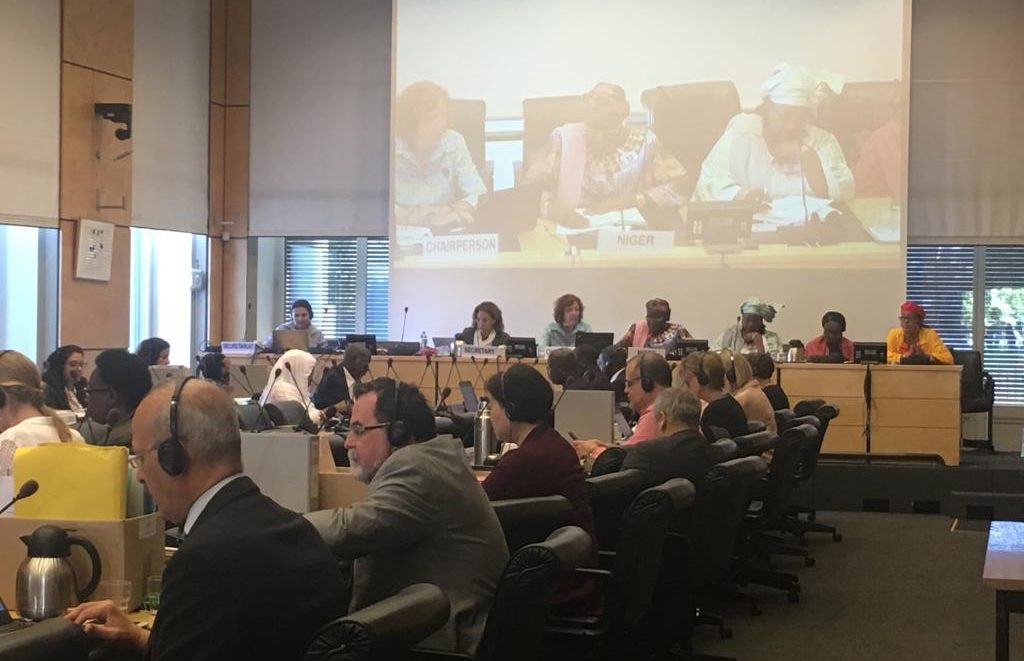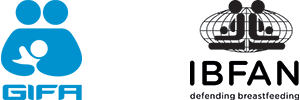
The 79th meeting of the Committee on the Rights of the Child was held in Geneva on 24 September 2018. As a prelude to this meeting, IBFAN GIFA had submitted to the committee members an Alternative report on Niger, based on the latest 2016 WBTi report for Niger, produced during the first phase of the Geneva IYCF project. IBFAN’s presentation on the situation of infants and young children in Niger highlighted a number of problems relating to the application of the Convention on the Rights of the Child (CRC) in the country, particularly with regard to infant and young child feeding. It also made recommendations.
Among other comments, IBFAN’s alternative report noted:
- Lack of recent national data on Infant and Young Child Feeding practices, in line with WHO definitions and recommendations; the last available data on breastfeeding indicators are from 2012;
- Implementation of existing national policies on IYCF remains limited due to a lack of resources;
- The last law in Niger on the International Code of Marketing of Breastmilk Substitutes was adopted in
1998 (Arrêté No. 00215) and does not cover all its provisions and relevant subsequent WHA Resolutions; - Training documents on IYCF are not sufficiently used in healthcare curricula and they are
sometimes outdated; - Only 36.1% of hospitals in the country are labelled “Baby-Friendly Hospital.” The initiative is
underfunded and there is no regular reassessment of the accredited facilities; - Breastfeeding rooms are not always available in the workplace, preventing mothers who return
to work from breastfeeding exclusively their babies until 6 months; - The Mother-to-Child Transmission rate of HIV remains high in the country (25% in 2015) and
only 40% of pregnant women living with HIV receive ARVs treatment; - IYCF support in emergency situations remain low and healthcare professionals are not well
informed on IFE.
In addition to these observations, IBFAN brought to the Committee’s attention in the same document several cases of violations of the ICESCR identified in Niger in 2015. Some of these violations had already been highlighted in the publication Look what they are doing in Niger.
In response to these comments, IBFAN made the following recommendations:
- Systematically collect data on breastfeeding and IYCF practices; these should be in line with WHO definitions and indicators;
- Allocate adequate resources to ensure policy implementation on IYCF; ensure that the
- National Multisectoral committee has a clear mandate and acts accordingly;
- Ensure that the Code and WHA resolutions are translated into national legislation; establish
an independent monitoring mechanism and set sanctions in cases of Code violations; - Ensure that health curricula across the country include updated training documents on IYCF;
- Strengthen the BFHI and guarantee regular evaluations of the accredited facilities;
- Allow for longer breastfeeding breaks and raise employers’ awareness on the importance of
defending their employees’ rights related to maternity, including through the creation of
dedicated rooms to breastfeed or express milk; - Ensure that all pregnant women living with HIV receive treatment to prevent MTCT (mother-to-child transmission) and
encourage additional counselling to ensure that all mothers living with HIV are well-informed
on how to best feed their children; - Revise and strengthen the policy on IYCF in emergencies, in line with the Operational Guidance
on Infant Feeding in Emergencies, to ensure an adequate protection of breastfeeding and
proper management of artificial feeding.
During the meeting, the members of the Committee of the Rights of the Child questioned the Niger delegation about Convention 183 of the International Labour Organisation (ILO) on maternity protection, which has not yet been ratified by Niger.
The Niger delegation did not provide an answer to this question, which led the Committee to make recommendation § 32 (c) (original in English) under the heading ‘Health and health services’, which recommends that the State of Niger should “Promote, protect and support breastfeeding, increase the number of hospitals certified as Child Friendly and fully implement the International Code of Marketing of Breast-milk Substitutes.”
In its concluding observations, the Committee on the Rights of the Child also made recommendations that indirectly address the problems highlighted in the IBFAN Alternative report on Niger. These recommendations are as follows:
Allocation of resources
- 8 (a) Increase substantially and prioritize the allocations in the areas of health, education, nutrition and protection to adequate levels.
Data Collection
- 9 (a) Expeditiously improve its data collection system. The data should cover all areas of the Convention and should be disaggregated, among others, by age, sex, disability, geographic location, ethnic origin and socioeconomic background in order to facilitate analysis on the situation of all children, particularly those in situations of vulnerability. The collection and use of data should be based on respect for human rights and for the principle of self-identification;
(b) Ensure that the data and indicators are shared among the ministries concerned and used for the formulation, monitoring and evaluation of policies, programmes and projects for the effective implementation of the Convention.
Independent monitoring
- 10 (a) Continue strengthening the mandate of the National Commission for Human Rights, including its mechanism for monitoring children’s rights and its capacity to receive, investigate and address complaints by children in a child-sensitive manner;
Dissemination, awareness-raising and training
- 11 Continue strengthening its efforts to raise awareness of the population on the provisions of the Convention, including by reaching persons belonging to minority groups and population in rural and remote areas.
Cooperation with civil society
- 12 Strengthen further its collaboration with civil society organizations, including by providing support for services delivered by civil society organizations related to the promotion and protection of the rights of children through formal agreements.
Children’s rights and the business sector
- 13 (a) Establish a clear regulatory framework for the industries, especially mining industries, operating in the State party to ensure that their activities do not negatively affect human rights or endanger environmental and other standards, especially those relating to children’s rights;
(b) Ensure effective implementation by companies, especially industrial companies, of international and national environment and health standards, effective monitoring of implementation of these standards and appropriately sanctioning and providing remedies when violations occur, as well as ensure that appropriate international certification is sought;
(c) Require companies to undertake assessments, consultations, and full public disclosure of the environmental, health-related and human rights impacts of their business activities and their plans to address such impacts.
Right to life, survival and development
- 17 (a) Address the poverty and structural inequalities underlying the high rate of child mortality in the State party;
(b) Improve its health services to decrease infant and child mortality by providing better protection against preventable diseases, such as malaria, respiratory
and diarrhoea causing diseases, raising awareness of methods of prevention, and providing appropriate health-care services for mothers and postnatal care for infants
and children, taking note of target 3.2 of the Sustainable Development Goals on ending the preventable deaths of children under 5 years of age;
(c) Implement the Office of the United Nations High Commissioner for Human Rights (OHCHR) technical guidance on the application of a human rights based approach to the implementation of policies and programmes to reduce and eliminate preventable mortality and morbidity of children under 5 years of age (A/HRC/27/31).
Health and health services
- 32 (a) Prioritize measures to improve access to and the quality of health-care and nutrition services, including by allocating sufficient financial resources to the health sector and ensuring the availability of qualified health staff.
HIV/AIDS
- 35 (a) Sustain the measures in place to prevent mother-to-child transmission of HIV/AIDS, including through increasing Prevention of Mother to Child Transmission centers both in urban and rural areas, and develop a roadmap to ensure the implementation of its plans by allocating sufficient human, technical and financial resources;
(b) Improve follow-up treatment for HIV/AIDS-infected mothers and their infants to ensure early diagnosis and early initiation of treatment;
(c) Accelerate the adoption of the Elimination of Transition of Mother to Child (e-TME) Plan for 2018-2020;
(d) Improve access to quality, age-appropriate HIV/AIDS, sexual and reproductive health services;
(e) Improve access and coverage of antiretroviral therapy and prophylaxis for HIV-infected pregnant women and girls.
Conclusion by IBFAN
The Committee of the Rights of the Child’s recommendations are an important starting point for national advocacy work to improve the situation of infants and young children in Niger. IBFAN GIFA, IBFAN Afrique and the national IBFAN group in Niger, GAPAIN (Groupe d’Action Pour l’Alimentation Infantile au Niger), will work actively to ensure that the Committee’s concluding observations on the Rights of the Child are followed up on the ground.
